 Petzlover
Petzlover Cabecudo Boiadeiro is originated from Brazil but Pandikona is originated from India. Cabecudo Boiadeiro may grow 9 cm / 4 inches higher than Pandikona. Cabecudo Boiadeiro may weigh 42 kg / 93 pounds more than Pandikona. Both Cabecudo Boiadeiro and Pandikona has same life span. Cabecudo Boiadeiro may have more litter size than Pandikona. Both Cabecudo Boiadeiro and Pandikona requires Low Maintenance.
Cabecudo Boiadeiro is originated from Brazil but Pandikona is originated from India. Cabecudo Boiadeiro may grow 9 cm / 4 inches higher than Pandikona. Cabecudo Boiadeiro may weigh 42 kg / 93 pounds more than Pandikona. Both Cabecudo Boiadeiro and Pandikona has same life span. Cabecudo Boiadeiro may have more litter size than Pandikona. Both Cabecudo Boiadeiro and Pandikona requires Low Maintenance.
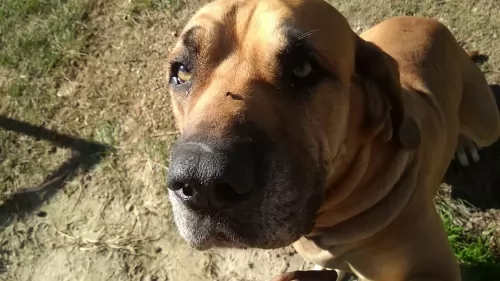 The Cabecudo Boiadeiro has always played an important role in the management of livestock. Stockdogs like this were known in parts of Minas Gerais as early as the 18th century. In fact reports tell us that the Cabecudo has existed since the 16th century as a working dog in the rural parts of Brazil.
The Cabecudo Boiadeiro has always played an important role in the management of livestock. Stockdogs like this were known in parts of Minas Gerais as early as the 18th century. In fact reports tell us that the Cabecudo has existed since the 16th century as a working dog in the rural parts of Brazil.
The Capecudo has remained much the same over the centuries – a dog created as a guardian for large properties, as a game hunter and livestock herder and protector. Today this Molosser dog still drives cattle in Brazil.
 The Pandikona hails from the village of Pandikona, India, but is in danger of becoming extinct. They have always been well adapted to the harsh conditions of the Kurnool district in India, and they are considered to be a primitive-type dog breed.
The Pandikona hails from the village of Pandikona, India, but is in danger of becoming extinct. They have always been well adapted to the harsh conditions of the Kurnool district in India, and they are considered to be a primitive-type dog breed.
It has always been a territorial dog that has been used to guard villages and today it’s a dog which isn’t recognized as a standardized breed by any of the major kennel clubs. It is essentially a companion dog today.
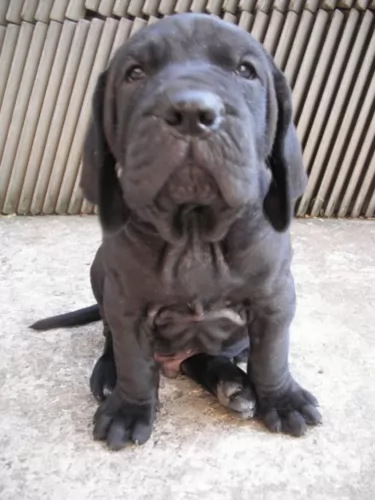 The Brazilian Cabedudo is a strong boned, large dog with a large head and a deep chest. The coat of the dog is short and dense and in wheat-colored shades or fawn shades, while brindle is also in existence. The Cabeçudo Boiadeiro is also known as the Brazilian Mastiff and is a large, imposing dog.
The Brazilian Cabedudo is a strong boned, large dog with a large head and a deep chest. The coat of the dog is short and dense and in wheat-colored shades or fawn shades, while brindle is also in existence. The Cabeçudo Boiadeiro is also known as the Brazilian Mastiff and is a large, imposing dog.
Because the breed was created from a blend of the English Mastiff, the Bulldog and the Bloodhound, not only is this a large dog in height, but a big boned dog as well. He has short to medium length floppy ears and a long tail.
The Brazilian Cabedudo is a courageous dog. When he has been properly trained and socialized, this large dog is capable of becoming an obedient, loving and devoted family pet who is able to get along with children and other pets too. He reserves this gentler side of him for his human family and won’t easily tolerate strangers.
 The Pandikona is a medium sized sighthound which stands at between 48 and 66cm in height and weighs in the region of 30 – 40kg. They are actually slightly built dogs, although the Pandikona can come in a variety of sizes as there is no selective breeding.
The Pandikona is a medium sized sighthound which stands at between 48 and 66cm in height and weighs in the region of 30 – 40kg. They are actually slightly built dogs, although the Pandikona can come in a variety of sizes as there is no selective breeding.
The breed’s coat is essentially short-haired and smooth with colors varying from solid fawn, white to black with white patches. Brindle is also sometimes seen. They are slim, muscular dogs with erect ears and a long tail that most times curves upwards.
These intelligent and very independent dogs are found roaming around Indian villages and guarding their owner’s property. They are territorial dogs, they are fearless too and make excellent guard dogs. They get on well with children as well as with pets, and with training they become loyal and faithful companions.
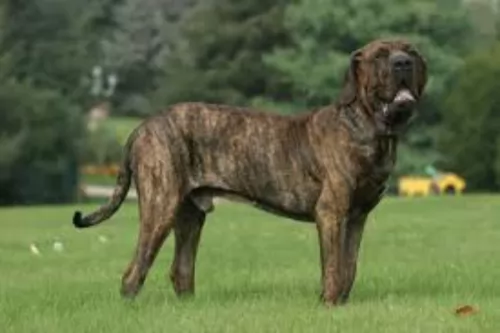 Deciding to become an owner of a dog is a big responsibility, as you are going to have your pet with you for 10 – 15 years at least. There are so many essentials to remember with owning a dog and most dogs are far happier and healthier when allowed to live part of the time indoors with their human family.
Deciding to become an owner of a dog is a big responsibility, as you are going to have your pet with you for 10 – 15 years at least. There are so many essentials to remember with owning a dog and most dogs are far happier and healthier when allowed to live part of the time indoors with their human family.
It's not always easy being a large dog such as the Cabecudo Boiadeiro, as people often assume these mastiff-type dogs are unfriendly and aggressive.
Every dog breed however, is essentially the product of his owners lifestyle and his unique upbringing with them. When this large pet is properly trained and socialized and he is loved and well cared for, he promises to be faithful, devoted, playful and loving – a real friend and protector.
 The Pandikona may well be a primitive-type hunting dog from India but he is robust and low maintenance, and capable of making a splendid pet. That is one huge tick in his favor already.
The Pandikona may well be a primitive-type hunting dog from India but he is robust and low maintenance, and capable of making a splendid pet. That is one huge tick in his favor already.
He is an active dog who likes to be kept busy but that doesn’t mean he is too busy to give his human family his loyalty and companionship. Easy to keep, the Pandikona promises to make you the most fantastic pet and friend.
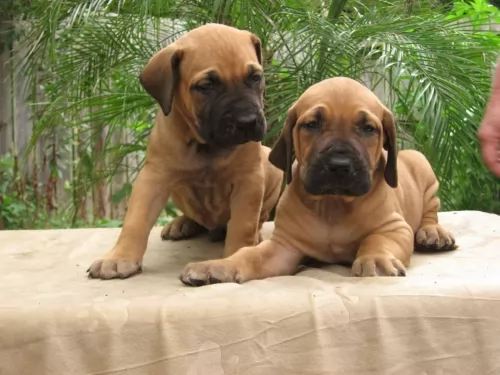 The Cabecudo Boiadeiro is considered a robust breed, used to lots of exercise while herding livestock. With good care and plenty of exercise he can live to 10, 11 or 12 years of age. He is a large breed and this fact alone will ensure that you be aware of some dog illnesses prone to larger breeds.
The Cabecudo Boiadeiro is considered a robust breed, used to lots of exercise while herding livestock. With good care and plenty of exercise he can live to 10, 11 or 12 years of age. He is a large breed and this fact alone will ensure that you be aware of some dog illnesses prone to larger breeds.
This is an orthopedic condition where the hip joints don’t fit properly into the hip joint. Larger breeds such as the Cabecudo Boiadeiro are at a higher risk of getting this orthopaedic disorder.
You’ll see your dog battling to move around and he may not even be able to get up again after lying down. Sometimes a dog might even require surgery. Thankfully, there is testing for hip dysplasia in dogs, and you can ask to see a clearance certificate if you buy your puppy from a so-called reputable breeder.
Progressive retinal atrophy (PRA) is a degenerative eye disorder that can actually lead to blindness in your pet. Night blindness sets in and your dog becomes unsure how to walk in unfamiliar areas, You'll notice that his eyes become gray or cloudy-looking as though there is a film over the eyes. Parent dogs with this eye disease should be spayed or neutered.
 Dogs are totally dependent on us for their care, and it is our responsibility to keep our eyes on them to ensure they are happy and healthy. It can be to you and your pet’s benefit to know some of the most common health problems that dogs face.
Dogs are totally dependent on us for their care, and it is our responsibility to keep our eyes on them to ensure they are happy and healthy. It can be to you and your pet’s benefit to know some of the most common health problems that dogs face.
The Pandikona dogs are super hardy – used to roughing it - and they’re not going to require much veterinary care. Even though this is such a hardy dog, you can never tell if a sudden canine illness strikes your pet. Sometimes it will be necessary to get your pet to the vet to be examined and to receive medication.
This is very common in dogs and an ear infection can be triggered by dirt and wax in the ear, allergies and ear mites or something else. Your dog will be scratching at his ear, shaking his head, there will be redness and possibly discharge and a nasty odor. Don’t hesitate to take your pet to the vet.
Roundworms, tapeworms and hookworms are horrible parasites that can cause a whole lot of unpleasant symptoms in your dog. He could have a cough, a dull, listless coat, diarrhea, a lack of appetite and weight loss. Treatment from the vet will depend on the type of worm that has infested your pet.
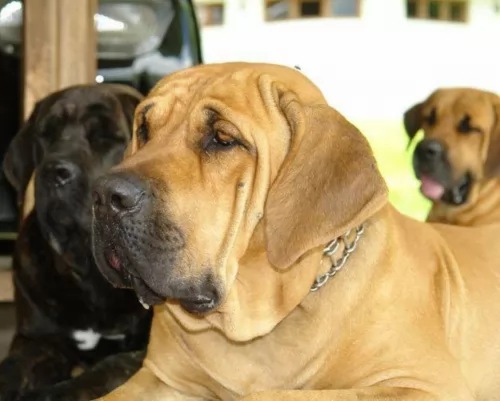 The Cabecudo Boiadeiro is a large breed dog. In spite of his size though, he is surprisingly an active dog. He will need regular exercise such as a brisk walk very day. You can also put aside time to give him some exciting ball games. He is a breed used to working so he will be most unhappy lying around doing nothing.
The Cabecudo Boiadeiro is a large breed dog. In spite of his size though, he is surprisingly an active dog. He will need regular exercise such as a brisk walk very day. You can also put aside time to give him some exciting ball games. He is a breed used to working so he will be most unhappy lying around doing nothing.
If you are going to be feeding your Cabecudo Boiadeiro commercially manufactured good, make sure it is the best quality food. Always go for dog foods which have all the nutrients your large dog requires.
You get wet, dry and raw complete foods and you can give your pet a mix of these. Always make sure that your pet gets some raw meat in from time to time too, otherwise he could battle with skin diseases.
If you aren’t sure how to feed such a large dog, your veterinarian will help you decide which category of food would suit your pet. Clean, cool water is to be provided constantly.
 There isn’t much information on the Pandikona but they have always spent their time roaming free around Indian villages. They’re used to having a lot of space to run and won’t do well in cramped spaces in the city. He wants to be busy and will certainly require you taking him on walks or allowing him to run free in a park. Ball games will also be appreciated as he loves lots of activity.
There isn’t much information on the Pandikona but they have always spent their time roaming free around Indian villages. They’re used to having a lot of space to run and won’t do well in cramped spaces in the city. He wants to be busy and will certainly require you taking him on walks or allowing him to run free in a park. Ball games will also be appreciated as he loves lots of activity.
Food is so very important to the health of dogs. As pets, the Pandikona deserves to have nutritious food which has all the right vitamins and minerals.
These days the best commercially manufactured dog foods can be a good choice for your pet and you choose these foods by reading the labels on the packaging and going according to the dog’s size, his activity levels and his age.
Dogs thrive on homemade food, especially when its simple and nutritious. Boiled chicken, some brown rice or pasta and some cooked vegetables such as sweet potato, spinach and carrots all chopped up and added into his kibble from time to time can only do him good. Some raw meat added in occasionally can also be immensely beneficial. Make sure he has always got a constant supply of fresh, cool water.
Check your Pandikona over from time to time. Check inside his ears for redness and signs of infection and check his eyes too. Brush him at least twice a week to get rid of dust and loose hairs. Trim his nails too and check inside his mouth for bad teeth.
Never ever leave him in a hot car or outside without shade and water. Make sure he has a nice dry comfortable place to sleep. He gives you unconditional love and companionship, and in exchange for this you want him to be well provided for.